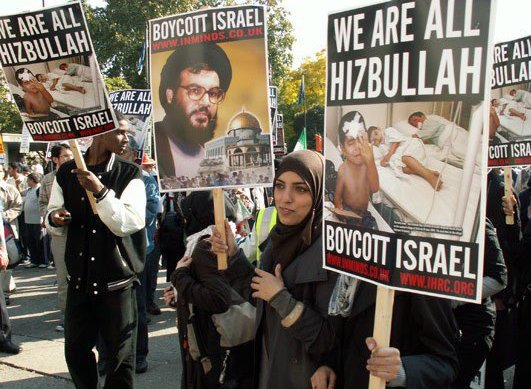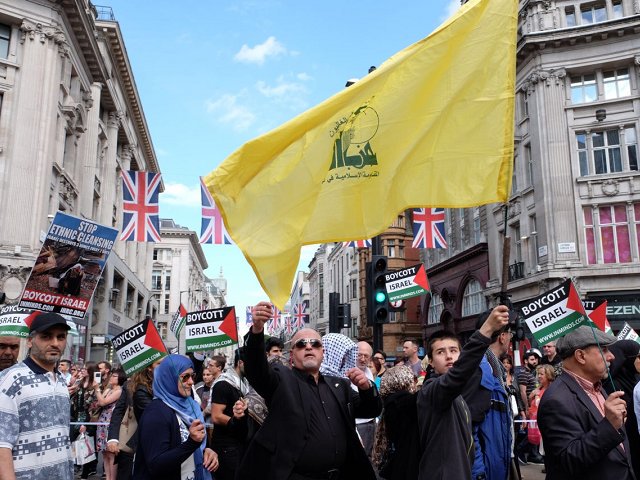Hezbollah in its entirety must be banned by the UK government – here's why
James Mendelsohn , University of Huddersfield Earlier this year , a billboard in Luton, England, had to be taken down after it was vandalised with graffiti. The poster was advertising an al-Quds Day rally. This anti-Israel, anti-American event originated in Iran and has spread to numerous other countries. In the UK, the annual London rally regularly features the parading of the Hezbollah flag. This is especially controversial, prompting calls for a change in the law . Hezbollah - from the original Arabic term meaning “Party of God”, which can also be transliterated as “Hizbullah” or “Hizballah” – is an Iranian-backed Shiite militia group that was established in the early 1980s. It was initially formed to drive foreign forces out of Lebanon and its bombing of French and American bases in Beirut in 1983 claimed 299 lives . Hezbollah is hostile towards Israel and supports President Bashar al-Assad in Syria’s civil war . Hezbollah’s emblem features a stylised assault rifle and its forces have adopted the “ Hitler salute ”. In 2002, Hezbollah’s leader, Hassan Nasrallah, said that if all the world’s Jews were to gather in Israel, this would make it easier to kill them in a “final and decisive battle”. The organisation has a track record of global criminal activity, with a particular emphasis on terror attacks – not only against Israelis, but also against Jewish targets worldwide . However, Hezbollah has also participated in Lebanese elections since 1992 . It holds government positions and provides social welfare . For this reason Hezbollah is not completely “proscribed” or banned under current UK law. Instead the government has banned the “military wing” of Hezbollah only, but not the “political wing”.Banning terrorist groups
The Terrorism Act 2000 gives the Home Secretary power to proscribe an organisation if it is “concerned in terrorism”. Hezbollah’s “military wing” has been proscribed since 2008. But its other “wings” – its MPs, government ministers and social welfare activities – are not. The Terrorism Act makes it an offence for a person, in a public place, to wear an item of clothing, or to carry or display a flag “in such a way or in such circumstances as to arouse reasonable suspicion that he is a member or supporter of a proscribed organisation”. In 2004, a man was convicted of this offence after passing through a Scottish port wearing a ring which prominently displayed the initials “UVF”. This had caused police to believe he was a member or supporter of the proscribed Ulster Volunteer Force, a loyalist paramilitary group.
More than just a flag
Some of the emblem-bearers – perhaps encouraged by the rally’s organisers in order to avoid trouble – even affixed stickers expressing support for the “political wing”. Yet they also chanted : “From the river to the sea, Palestine will be free.” This is generally understood to be a call for the military destruction of the state of Israel. This would suggest that the marchers were not supporting only Hezbollah’s “political wing”, but its “military wing” also.
Our military apparatus is not separate from our overall social fabric. Each of us is a fighting soldier.In 2000, deputy secretary general of Hezbollah, Sheikh Naim Qassem said :
Hezbollah has one single leadership…It manages the political activity, the jihad activity, the cultural and the social activities…we have one leadership, with one administration.In 2002, Muhammad Fannish of Hezbollah’s political bureau said :
No differentiation is to be made between the military wing and the political wing of Hezbollah.In 2013, Hezbollah’s political affairs official, Ammar Moussawi, said :
Everyone is aware of the fact that Hezbollah is one body…Its military and political wings are unified.In 2013, Hassan Nasrallah said :
However, jokingly I will say – though I disagree on such separation or division – that I suggest that our ministers in the upcoming Lebanese government be from the military wing of Hezbollah!Such statements cast serious doubt upon the distinction between the “military” and “political” wings maintained in UK law. It makes no sense to proscribe only the former but not the latter, when Hezbollah’s own representatives insist that there is no real division between the two.
Back to News List
